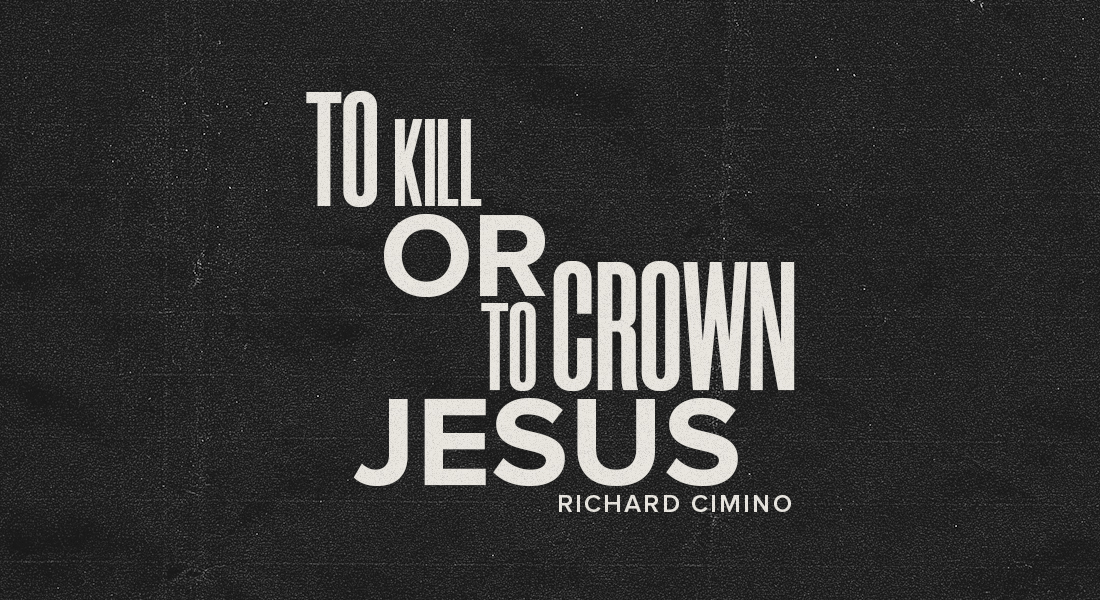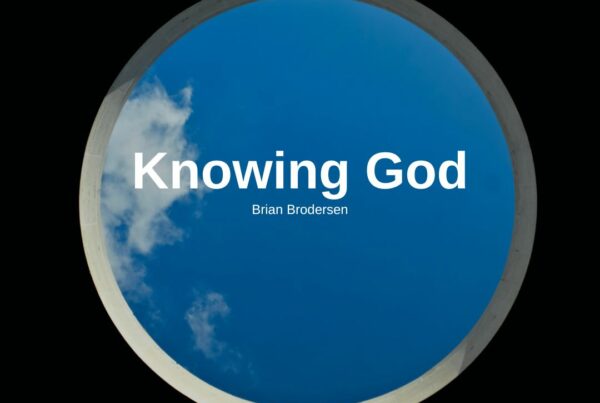
Jesus said He would be crucified.
“And as Moses lifted up the serpent in the wilderness, so must the Son of Man be lifted up, that whoever believes in him may have eternal life” (John 3:14-15).
Psalm 22 predicted Jesus would be crucified. Isaiah 53 predicted that Jesus would be crucified. Zechariah 12:10 predicted that Jesus would be crucified. God was sovereign over the worst in humanity.
This whole scene is filled with voices and choices: Pontius Pilate and Barabbas the robber.
The voices and choices in this trial unveil how broken humanity is and how humble and majestic Jesus is.
“Jesus stands before Pilate” (Luke 23:1–25).
“Then the whole company of them arose and brought him before Pilate” (Luke 23:1).
The only reason the average person knows anything about Pontius Pilate is because of his relationship with Jesus Christ. If Pilate had not been the governor of Judea at the time of Jesus, he would have lived and died in obscurity. There were thousands of Roman officials commissioned throughout the Roman Empire, but I doubt that any of us know even one of them by name. But Pilate is known throughout history because of these moments he spent with Jesus.
Pilate possessed great power and position in the Empire. But he hated Judea — he hated the Jews — he had zero concern for them or for their religion — all of which led to decisions that resulted in horrific political setbacks with the Jews that put his entire career in jeopardy.
Pilate’s life was defined by his decisions concerning Jesus — and most importantly the consequences of his indecision concerning Jesus. Life is filled with decisions.
There are political decisions. As the voting results from presidential elections are reported, there are graphic banners running across screens that say “Decision 20_ _.” There are educational decisions. Purchase decisions (Buying a car, buying a house, school district, square footage, neighborhood). Relationship decisions — Is this the one? Each of those decisions has consequences — some small, some life-changing.
But there is one decision that has eternal consequence.
That is the decision that we make concerning Jesus Christ. The Holy Spirit inspired the authors of all four accounts of the life and mission of Jesus (Matthew, Mark, Luke and John) to hold this man, Pontius Pilate, before us because his decision was made through the filters of a value system that could never supply the deepest need of his heart — a value system that has without exception failed everyone. He came down on the wrong side of the decision concerning Jesus — when all the while he tried everything in his power to make no decision.
In verse three, we find Pilate face to face with Jesus for the first time.
“And Pilate asked him, ‘Are you the King of the Jews?'” (Luke 23:3).
No doubt Pilate had heard much about Him. He wouldn’t have failed to miss the way Jesus entered into Jerusalem on the first day of that week with the crowd shouting, “Hosanna, Hosanna! Blessed is the King who comes.” Then there was a Cohort (600 Roman soldiers) involved in the arrest of Jesus in the Garden of Gethsemane. The ranking officer would have had daily communications with Pilate. He had spies all through Judea and Galilee. In fact, Matthew and Mark tell us that Pilate knew exactly why the religious rulers had brought Jesus to him.
“For he knew that it was out of envy that they had delivered Him up” (Matthew 27:18; Mark 16:10).
Pilate didn’t ask, “Are you the Messiah? Are you bringing salvation? Are you from heaven?” Pilate had ZERO interest in such things. Pilate’s question had everything to do with the brief biographical sketch of this man. “Are you the King of the Jews?” “Do you have a political agenda?” “Are you out to oppose Caesar and me?”
All four Gospel accounts give us the answer of Jesus to this first question: “And He answered him, ‘You have said so.’”
In John 18:34 we read, “Jesus answered, ‘Do you say this of your own accord, or did others say it to you about Me?'”
This is radical! Suddenly, Pilate’s on trial! The beaten, disfigured and defenseless Jesus was holding court on Pilate; and by proxy, you and me.
So many people think that Jesus is on trial when someone shares the Gospel with them! REALITY — Jesus is judging them! THEY are the ones on trial!
We need to bear this in mind — Jesus loved Pilate. Jesus was after Pilate’s heart. Jesus was appealing to him — “As you stand here and look at Me, are you asking if I’m a king because you need to know for yourself? Do you have a conviction in your heart about Me? Or are you just saying this because it’s popular opinion, and other people told it to you?” Jesus wasn’t asking to obtain information. He was asking so Pilate could discover the truth about himself.
“Pilate answered, ‘Am I a Jew? Your own nation and the chief priests have delivered you over to me. What have you done?’” (John 18:35).
Without a doubt, Pilate did not expect the answer that he was about to hear from this bloodied, disfigured man standing before him.
“Jesus answered, ‘My kingdom is not of this world'” (John 18:36).
At this moment, Jesus shows us how to deal with our post-everything world. Jesus loved this man. Jesus was probing Pilate and provoking Pilate to consider Him. Pilate could only come up with, “What IS truth?” That is the battle cry of our post-modern, post-Christian, post-Truth world!
We shouldn’t be shocked by post-modern man’s take on truth. We should be shocked at how Jesus — even after He had been brutally beaten and disfigured — loved this man and tried to draw him to the truth.
DON’T MISS THIS — Pilate was CONVINCED that Jesus was innocent. But he could see how volatile this situation was. Pilate had to make a decision between his CONSCIENCE — what he knew to be right about Jesus — and CONVENIENCE — a course of action that would bring him the least amount of grief.
We are always faced with the choice between conscience and convenience.
“You always said people don’t do what they believe in, they just do what’s most convenient, then they repent”– Bob Dylan
If Pilate had an ounce of integrity, it would have been, “I find no fault in this man” — PERIOD! But there was that ring he wore — that ring said that he was the “Friend of Caesar.” That relationship, and the prestige, the position and power it brought to him, was his idol. It was the very thing that defined him; the thing that he lived for. Pilate could not put a period at the end of his judgment because he knew that his decision was not the decision that was going to satisfy the Jews — and as a result, it was a threat to his idol — a threat to his status as governor and “Friend of Caesar.” So, Pilate immediately jumped on a potential escape route. By the way — in any and all wrong decisions concerning Jesus, the first course of action is to identify the idol.
That was Pilate’s official judgment — he made it on behalf of the Senate and the people of Rome. So, Pilate tried another potential escape route.
The Roman system of justice was unyielding. If you pronounced a man innocent, the authorities had no right to punish him after that. You were to let him go.
“But they all cried out together, ‘Away with this man, and release to us Barabbas’” (Luke 23:18).
Barabbas is mentioned in all four gospels — I believe — for very definite reasons. We don’t know a whole lot about him. “Bar-Abba” means “Son of the Father.” There are those who say that his name was actually Jesus Bar-abbas.
“In the hands of some first-century authors, however, the word depicts not simply a thief, but a terrorist”– D.A. Carson
Matthew tells us he was “a notorious prisoner” (Matthew 27:16). Luke and Mark tell us he was an insurrectionist and a murderer. He was scheduled to be crucified. In light of what transpired here, we can see that it was originally Barabbas who was going to be crucified on Golgotha between two other thieves.
Jesus died on the very cross Barabbas was going to die on.
If anyone could say, “Jesus died for me,” it was Barabbas. He knew that he was guilty. He knew that he was facing the death penalty. He knew that there was a piece of wood with his name on it waiting for him to carry outside of the city where they would nail him to it. He knew that he was released and that Jesus died in his place — the innocent for the guilty.
As brutal a man as he was, the shouts that he heard must have made him buckle. Then he heard the sound of the key unlocking his cell. He discovered that Jesus Christ was dying in his place. On a human level, try to imagine what that moment was like as he realized that the piece of wood that he was going to carry to his own death, was now going to be placed upon a substitute.
But we see it from an even more radical vantage point. Here is the best in the universe, God incarnate, and the worst in humanity, and whom do men choose? God incarnate dies in the place of the brutal Barabbas.
“For he hath made him to be sin for us, who knew no sin; that we might be made the righteousness of God in him” (2 Corinthians 5:21, KJV).
“He himself bore our sins in his body on the tree, that we might die to sin and live to righteousness. By his wounds you have been healed” (1 Peter 2:24).
Remember — The Gospel is not religious advice.
The Gospel is the startling proclamation of what God did for us!
The Gospel is the startling proclamation that because of what God did for us, anyone can be right with God. The Gospel proclaims that God offers to open the prison cell, release us from the bondage of sin, and have Jesus die in our place.
“Then Pilate took Jesus and flogged him” (John 19:1).
We don’t want to miss how brutal Pilate was willing to be to maintain the privileged status of wearing that ring that said, “Friend of Caesar.” He essentially said — “I’m not going to kill Him all the way — I’ll half-kill Him. When this mob sees Jesus torn to shreds, they will leave me alone, and I can be rid of Jesus.”
The first blows caused bleeding from the capillaries and veins. But as the blows continued in frequency and intensity, the back was torn to shreds, and there would be arterial bleeding. Once the hooks were sunk deeply into the tenderized flesh, the executioner would rip the skin, muscle, tendons and even bones off the victim. Victims would shake violently and bleed profusely.
History records that upon occasion, the hooks would go so deep that a rib would literally come flying off the body of a living man. Eyewitness accounts tell us that by the end of the Roman scourging, the victim’s back was a mass of hanging, unidentifiable flesh — and you could actually see internal organs! The victim would go into shock. His body was covered in blood. The Lictor would then untie the hands of the victim, and he would collapse in a pool of his own blood and flesh.
Seven hundred years before the scourging of Jesus, the prophet Isaiah predicted the results of Jesus’ scourging:
“Many were astonished at you—his appearance was so marred, beyond human semblance, and his form beyond that of the children of mankind” (Isaiah 52:14).
In the most personal way — Barabbas, the guilty man was released — the innocent Son of God was crucified in his place. THAT is the Gospel.
Does it blow your mind how gracious God was to Pilate? Jesus spoke to Pilate in His first civil trial before Pilate. Jesus continued to speak to Pilate the second time He stood before him.
DON’T MISS THIS — Pilate teaches us that whatever it is you hope to gain by compromising concerning Jesus — you can NEVER keep it! Within 10 years, Pilate would lose his position as Prefect and Governor of Judea and be sent back to Rome. By the time he was sent back to Rome, Tiberius had died. Caligula was Caesar. Caligula banished Pilate to the region known as Gaul where he ended up committing suicide. Here he had compromised everything in regard to Jesus in order to secure his identity as the “Friend of Caesar” — and his place in the Roman Empire. He chose friend of Caesar over friend of Jesus — the King of kings and Lord of lords.
You’ll have to kill Jesus or crown Jesus.
Voices and Choices: Kill Jesus or Crown Jesus. That is the decision that everyone must make. This is the decision that determines forever for you. This isn’t like the choice someone makes to flee approaching peril.
This is a decision to flee from eternal loss, eternal darkness — to the light of Jesus Christ. This is the decision to choose life over death.






